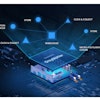
Attracting and retaining workers in the food and beverage manufacturing and processing industry is a challenge. Even prior to the pandemic, companies had been frustrated by the qualified labor shortage. But, over the past year, the situation has become even more acute and it’s one that many organizations are addressing with the help of technology.
The backbone of organizational performance – advanced enterprise resource planning (ERP) solutions -- are the critical thread that runs throughout the organization and the hands of the majority of employees. It is a crucial tool that can either empower or impede the employee experience. As well, as the central information repository, ERP solutions play an important role in helping mitigate risk due to attrition, ensuring when and if employees do leave, institutional knowledge doesn’t walk out the door with them.
According to the U.S. Department of Agriculture (USDA), in 2019, the U.S. food and beverage manufacturing sector employed 1.7 million people, or just over 1.1% of all U.S. non-farm employment. However, with a global population expected to grow to almost 10 billion by 2050, according to the United Nations, there is increasing pressure on the industry to perform. To attract a new generation to a career in food and beverage manufacturing, companies will need to meet the demands of younger workers, lest recruitment (and retention) will remain an ongoing challenge.
Attracting and retaining young talent
The Millennial generation was the first to truly grow up immersed in technology and is therefore familiar with computers and the internet. They also happen to be the largest generation comprising the U.S. workforce. According to Pew Research, more than one in three American labor force participants (35%) are Millennials, and in 2020, Millennials overtook Baby Boomers as America’s largest generation. And, their numbers are only growing.
Given that Millennials and those who were born later have grown up alongside technology, they expect to use the latest technology in the workplace. Not having an advanced ERP system could be a reason for workplace dissatisfaction and employee turnover. In fact, according to Zapier, more than 90% of younger workers are embracing automation as a way to work smarter, and “… younger employees are willing to walk away from a job with bad tech.”
Fortunately, ERP solutions have evolved in time for food and beverage companies to meet younger workers’ technological expectations. Today, mobile apps are making information and processes accessible instantly on the go and from anywhere on any device. Solutions also now enable employees to share knowledge and provide critical insights in real time. With instantaneous communications, feedback and access to information, workers can head off issues and collaborate more effectively. Today’s next-generation ERP systems surface insights relevant to user’s roles and assists in eliminating mundane tasks; this ultimately results in a more rewarding employee experience by affording more time to be spent creative problem-solving. This translates to better job satisfaction which can go a long way toward employee retention.
An advantage to the younger workers’ familiarity with and expectations for digital work environments is that they are typically ready to use ERP systems, without needing extensive training or upskilling. ERP developers have also incorporated more intuitive user interfaces, making it possible for workers to use the software without extensive training. Thus, modern ERP drives efficiency and productivity in daily processes, making it possible for employees to be more focused on the business versus dealing with inefficiencies and resource waste within processes.
A remaining challenge, however, is to develop a workforce that is empowered to make decisions and is well-versed in procedural continuous improvement. Technology development is outpacing corporate change and qualified staffing, within the context of ever-more technology-based roles. Change management is the answer to this challenge, along a well-defined transformation plan.
Retaining institutional knowledge
In what some demographers are calling “the silver tsumani,” aging workers heading into retirement are adding to labor shortages. According to the Bureau of Labor Statistics, more than 76 million Baby Boomers are expected to retire in the coming years, and their current labor participation rate will fall from 80% to below 40% by 2022. For 2019, the USDA calculated that the number of people employed in agriculture, food and related industries was 10.9% of the workforce. This means that potentially more than 7 million Baby Boomers will leave the U.S. food and beverage workforce by 2022.
Many of those food industry workers about to retire have been using legacy, even proprietary, computer systems that require extensive training to understand and use and are responsible for inefficiencies within core processes. With such systems, much of the knowledge resides with the operator, and, when that person leaves the company, so does the institutional know-how. According to the article, “Knowledge Loss: Turnover Means Losing More Than Employees,” from HR Daily Advisor, rebuilding the lost knowledge is often a slow, inefficient, and frustrating process for all involved and a huge drain on productivity. The article’s author assets that “the average U.S. enterprise-size business may be wasting $4.5 million in productivity annually just due to failing to preserve and share knowledge …”
Because ERP is the pivotal system connecting and controlling most operations, from human resources to customer management, business intelligence and financial management to inventory and supply chain, ERP solutions can be the keystone for an integrated and seamless sharing of knowledge. When an ERP system is fully integrated and adopted by all employees for their daily operations, it becomes the central repository of knowledge and the guide star for how work is done. In this way, ERP systems are critical in mitigating risk and retaining control of valuable business information if and when employees leave the company.
Though there are multiple other reasons for food and beverage companies to implement ERP, including improved collaboration among workers, improved business intelligence and analytics, higher productivity via automation of mundane or tedious processes, plus improved production planning and resource management, they are also taking a starring role in improving talent acquisition and retention, while mitigating institutional knowledge loss due to attrition. Given the rising tide of labor shortages, for these last two reasons alone, companies should look to ERP solutions to aid their overall risk management approaches.




















